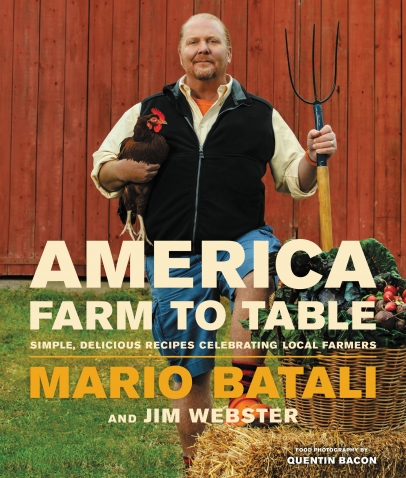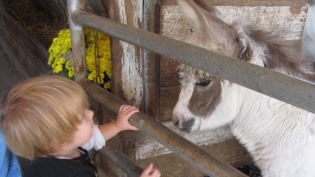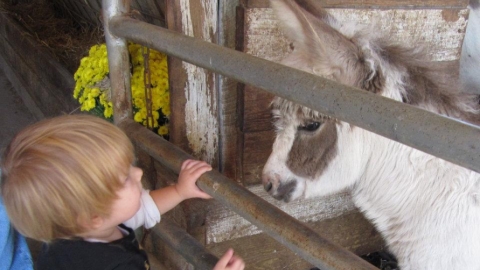Mario Batali Talks Meditation, Pasties with Edible Indy
Last December at an Indy Chef Throwdown, I watched as Indianapolis chef, Greg Hardesty, spoke from his heart about Indianapolis’ food scene and how far it’s come in the last 15 years. From chefs to food lovers, there are few of us who can argue these words. This progression has brought Indianapolis chefs and restaurants national attention and accolades, and quite simply, better food offerings and nosh spots for us all. So it came as no surprise to Edible Indy that world-renowned chef Mario Batali made the Indianapolis area one of his most recent stops.
On November 21st, Chef Batali came to Market District in Carmel to promote his newest cookbook, America – Farm to Table, which captures the essence of local food and one of the food industries most important workers, the farmer. There were 1,200 free tickets offered to this event, which sold out, and Chef Batali offered media five minutes to ask questions. That’s right – five minutes.
So what do we ask a chef who has 25 restaurants (and counting), has penned 10 cookbooks and has been named the Best Chef in America by the James Beard Foundation (oh there’s a lot more, I just picked these few to demonstrate this chef’s magnitude)? Well, our team thought carefully, calmly and when we had our five minutes it was fun, organic and something special for Edible Indy. Chef Batali was down-to-earth, charming and above all, we laughed a lot.
Rachel: I know you practice mediation…
Chef Batali: Yes, wow, what an interesting start…
Rachel: Yes…I’d like to know about why you do that and how it has changed you as a chef and a person.
Chef Batali: I realized I was feeling busy and behind…all the time. And that was natural and I was not uncomfortable with it, but some friends of mine that practice meditation said listen give this a try it allows you to be more refreshed than even a long nap or an than an evening of sleep, and it also helps you focus. And what I was realized was that after I started it, I practiced it right from the David Lynch Foundation, a guy named Bob Roth, who kind of runs it, and we did a couple of them and I realized you know not only am I able to really stay busy at work, but I can stay really busy when I focus on mediation. And in a 20 minute session twice a day, not only do I enjoy it, but it adds to my ability to do more during the day, and not that I’m trading it in and trading it out, but what I really realized is that it takes a little bit of the confusion out of my day. It also adds the feeling of contentment when I realize that one little piece of the puzzle is done as opposed to waiting for the whole puzzle to be done. And it also diminishes my anger at the natural foolishness of a lot of people around me. I’m not so mad at them. I’m like OK, whatever…
Kate Hopper (Assistant Managing Editor): I need to meditate!
Chef Batali: Yes, you do! Exactly.
Rachel: Everyone does.
Jennifer Rubenstein (Co-owner and Publisher): As a redhead do you have that typically…because I’m a little fiery.
Chef Batali: Yes, you do. And what you realize is that…whatever someone says that seems, because you’re overthinking it too quickly, that that was either a diss or a dismissive phrase, or even malicious, you realize no, it’s not me that’s being confused, they need to focus a little more about what their meaning was. So it allows me to feel much better about life and I’m not as mad or I don’t get as quickly lit up when someone makes what I think is a foolish mistake. I realize the real mistake is that I need to train them to approach it better.
Rachel: Nice. Nice.
Chef Batali: Does that answer the question?
Rachel: That does. I could talk about that for probably hours.
Chef Batali: So could I.
Rachel: I like meditation, but I’ll move on to something else. In terms of sustainability, what do you think in your restaurants is a good example for youth coming up that you do as a sustainability measure for them to model?
Chef Batali: Well I think what they need to realize is that everything that the LEED certification kind of manifests…seems like you’re doing it for the right thing, which is the PR and the life of the planet, but fundamentally what you realize once you really started getting involved in this is that your costs are going to go down and the double-edged sword of doing the right thing and having your costs go down is something that is immeasurably excellent. So we do everything. We compost, we use all the right light light bulbs, we use the low... low water force spritzers in the kitchen. Like everything that we do to achieve LEED certification – which we have in every one of my restaurants – [we’ve] got two ways to make it happy for us. In terms of young cooks, I think what they need to realize is that the smartest way to cook is to use the least expensive ingredients, which in the produce world means that they’re the ones that are in season and the ones that have traveled the least. That traveling the least lowers the carbon footprint, makes it more tasty, makes it more interesting and the win is actually in the flavor department. But in the cuts of meat, it means you’re not throwing away life, you’re not getting rid of animals entirely just so you can use the strip streaks and the filet mignons. But learning how to braise the cheeks, or the shins or the toenails, or the eyebrows, is a way to really do the right thing as well as create the unique environment around you where people say, “Yeah, I can get a steak. I would go to a steakhouse or I could cook it at my house, but who’s gonna braise the lower lip of a pig for me? Mario Batali’s gonna do it. And he’s going to make it tasty.” And when you do that you’re also creating a unique brand for yourself.
Rachel: Oh…our time is up.
Chef Batali: You can ask a couple more, come on…
Katie: We can ask one more.
Chef Batali: Two more.
Rachel: Two more! OK…so you like Traverse City and Northern Michigan, so what’s your take on pasties [said with a long a, like tasty]?
Chef Batali: Are they called pasties [long a] or pasties [said with a short a, like pastel]?
[Lots of laughter and discussion about how to say it.]
Jennifer: They’re called pasties [with a long a].
Chef Batali: I love them both!
[Now we’re all rolling in laughter.]
Jennifer: They’re hand pies that are savory, I promise.
Chef Batali: I know what they are but my Michigan friends call them pasties [with a short a]. But, they’re all from the UP, so maybe it’s a different part.
Jennifer: OK so we’re on the east side.
Chef Batali: In any case, I love encased meat and potatoes in pastry… for either one.
[Still… more laughter.]
Chef Batali: I like them all. There are heavy ones, and light one, I prefer slightly lighter. The original Cornwall pasty, which was for the miners, was leftover whatever wrapped in pastry so they could carry it in.
Jennifer: Really? That’s very interesting. I didn’t know that.
Rachel: He looked at me like I was crazy when I asked about pasties.
Katie: What about opening a restaurant here in Indianapolis?
Chef Batali: I would only open a restaurant here if one of my already existing employees said “I wanna go live in Indianapolis,” which is not out of line. Like a lot of people are returning back to their world, but I wouldn’t just send a sous chef out here and couple of people because I think that’s…it’s not genuine. But if one of my people that I’ve been working for – and the only reason why we open new restaurants is not because we have a manifest destiny to take over the world – we, we want to make sure that the people that have been working with us for a long time, and that we have a spent a lot of blood, sweat and tears training, and they have spent the same amount, if not more, we want them to be successful so if they get to the artificial glass ceiling of being the executive sous chef of a restaurant that they’ll never get ahead because the chef’s never gonna leave, we help them open a new restaurant. That’s why we have 24 restaurants. I have 24 chef partners.
To learn more about Mario Batali, his passion, his mission and his career visit his website at MarioBatali.com.
Listen below to this crazy, laugh out loud funny interview unedited:







